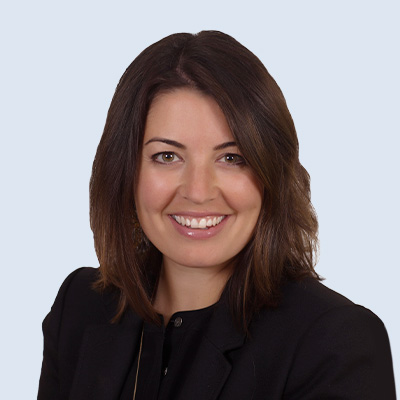Elizabeth Watson: Hi, I’m Elizabeth Watson, principal with the Alexander Group and I’m joined today by Wendy Bronner, VP and head of commercial for KARL STORZ. Thank you so much for joining us today.
Wendy Brauner: Thank you for having me, Elizabeth.
Elizabeth Watson: We are going to spend some time learning about your career journey, in hopes that it inspires others who are coming to our website to view today’s video. So, I want to start from the beginning. Can you tell us about your career journey and then a little bit about what you do today?
Wendy Brauner: Sure. My career journey is a little itinerant, but it’s always centered in different facets of commercial. I’ve done marketing and sales and business development and sales management and product management. I’ve spent some time in a variety of industries and a variety of countries working in different facets of the sort of commercial wheelhouse. And that’s culminated with today I am the head of commercial for the U.S. for KARL STORZ Medical Device company headquartered in Germany, and I’ve been in the role for just under a year now.
Elizabeth Watson: Great. And what attracted you to the healthcare industry?
Wendy Brauner: I was actually in financial services at the time I made the switch. I had both of my children and I had this idea that someday they would ask me why I left them every day and went off to work. And even though I was really enamored of my online check images and online bank statements that I had produced, I wanted to give them an answer that was more meaningful and impactful. And my dad is a physician and my mom is a social worker. And so I’d always sort of been on the edges of healthcare. And I thought, you know, even though I’m in these commercial spaces, maybe I can lend the skills I’ve developed there to something that ultimately will really have a meaningful impact on someone and their family. And so that drew me to healthcare.
Elizabeth Watson: That’s great. You were talking a little bit about your journey. I’m curious specifically your roles in revenue operations as well as marketing. How did that prepare you for this large commercial role?
Wendy Brauner: Yeah, it’s a good question. I think really it was it was the variety of roles that I had in so many different facets. And I thank you for saying revenue operations because I neglected that one and it was huge. But for marketing and revenue operations in particular, I think that that ability to know the voice of the customer, to understand markets, to think about and understand how to approach markets and then revenue operations, gives you this perspective on so many different facets that enable a commercial organization to move. So I think the blend of the customer proximity and then what moves in a sales organization, what moves a marketing organization were helpful ingredients. And then again, combined with that direct sales and sales management experience to be able to pull it all together into a commercial role.
Elizabeth Watson: You mentioned making a commercial organization move, and I know you’ve played a role many in many transformations. Can you tell me how you’ve managed some of those large transformations, especially in this new role?
Wendy Brauner: Yeah, I was thinking about this question of transformation. You prepped me with some questions in advance. And I was thinking I’ve had personal transformations as well where I’ve taken on roles in sales, taken on roles in operations. And I thought, oh my gosh, I don’t know how this is going to work out. And it’s kind of the same principle I apply to these organizational changes. You think about the things that there are to learn, the areas that there are to grow, the areas that there are to bring others along to lean into others on the path. We went through a commercial transformation project with the support of Alexander Group that we launched in April. Some pieces of it are going amazingly well, and other pieces are having growing pains, which we absolutely knew would be the case coming into it. So, we’ve had a heavy reliance on change management. On communication, I’ve spent an enormous amount of time in the field visiting with market teams, on calls, in communications, just really working to make sure we understand what’s going well and how can we do more of that, and where are we? Where are things not exactly as we’d intended? And how do we pivot and make corrections to address those so we can really get the organization seizing the full potential of the transformation opportunity?
Elizabeth Watson: That’s great. Speaking of transformations, you’ve mentioned a lot of pieces about working with the team and bringing them along and some of that change management piece. What are some of the things that you do to motivate and energize your team?
Wendy Brauner: Well, I think salespeople love being competitive, so they have their own built in motor around that motivation, I do. As I mentioned, I send out monthly emails. I celebrate the wins that we’ve had. I try to lean heavy on collaboration because it’s a big part of our transformation around the market, teams collaborating, but people’s names are in bold and I get notes from people saying, “oh, you forgot so-and-so and you forgot their deals”. So they’re definitely motivated by seeing colleagues’ names in lights and wanting to see their own names there. At our national business meeting, I also really wanted to make a point, because we were going through a transformation of people knowing that you’ve got our support, and you can do this. I actually had the folks in the audience, the team, turned to one another and say, you’ve got this and then turn to one another again and say, I’ve got you. And then I got them all yelling at the top of their lungs, “we’ve got this” repeatedly, because you have to do that to get the energy up. But that newsletter now that I send out every month is tell us how you’ve got this. Tell us how we’ve got this. And really, just focusing focuses on winning while also acknowledging that things are not easy right now, that they are having a difficult time. I think people just inherently and certainly our sales organization, they want to feel seen and heard.
I really try and put a lot of energy towards making sure that people feel seen and heard about their wins and about their challenges, that they know that I’m listening, that they know that I’m taking action. And so then when I’m working to rev them up, there’s sincerity behind it. There’s action. They know that that support is there. And I think that that motivates them. And then the biggest thing of all in health care is purpose. Because at the end of the day and health care, you make a choice to go into this profession because you want to impact people. Last year at our meeting, my mom had just had brain surgery. I shared with the team. I mean, that week she had had brain surgery. That’s why I made them yell loud because she’s a little hearing impaired. She’s great now, by the way. But I said to them this is intensely personal. There’s nothing more personal because everyone we or everyone, someone we know or love will be on a table or in a chair at some point. And so what we do and working so hard and pushing so hard really matters, because it impacts real people and real families at the end of the day. And I think that’s very motivating as well.
Elizabeth Watson: I like that extra personal note on top of all the other things that you mentioned. So, we’ve talked about a lot of what you’ve done and the journey. If we think to the future and your legacy, what are some of the things that you’d like to leave behind or the things that you’d like to be known for in your career?
Wendy Brauner: So I think a couple of things, I really value an accountable culture. So having people feel like they really own their own success, they own their own performance. They own figuring out how to get things done and take that seriously, because this is really important and is really personal. So leaving that sense of organizational accountability and individual accountability. And then the other thing we talked recently at a team meeting about what’s your superpower? And I’ve always said my superpower is connection, whether that’s connecting the dots and strategic thinking and systems thinking or whether it’s connecting with individuals. And it does really matter to me that people work in an organization where they, as human beings and as individuals, are seen and heard and valued. In addition to their contributions to the company being valued. So that feeling of individual accountability and that connection and leaning into the team are two things that I really hope that people feel from me and will carry forth with each other, too.
Elizabeth Watson: Yeah, and I like that thread too, to the previous answer around. It’s personal and you’ve made that connection too as you’ve motivated others. And then that’s a big part of your legacy as well? If we think about some of the folks who might be watching this video, what advice do you have for other aspiring leaders as they’re climbing the ladder?
Wendy Brauner: Well, first, I would say it’s embrace the lattice, not just the ladder, because usually if you look up the ladder, someone’s butt’s there, so you can’t really go straight up. So, think about the things that will enrich and enable you and fill in your gaps. Whenever I’ve been looking at new jobs, a friend of mine had this great concept. He told me, you have to think about what? What am I hiring this job to do for me? So think about what are the gaps I’m looking to fill, or the competencies or experiences that I’m looking to to build or to have, and whether or not they are terrifying or uncomfortable, just do it. Because you will learn no matter what. One of my early mentors told me I was capable of things that I thought I wasn’t capable of, and it turned out he was right, because I leapt into scary places that I thought were unintentional exit strategies, and they ended up being successes each time because I threw my whole self into it. So I would say, I know it’s cliche, but get comfortable with being uncomfortable. It is where the growth is and there’s a lot to be gained from that. So that’s I would encourage people to explore the lattice, gain those skills, be uncomfortable. Eventually you’ll get up the ladder or you’ll get up a different ladder you hadn’t anticipated. That would be my advice.
Elizabeth Watson: Yeah, I can see how that resonates, too. And not only in your resume and the different roles you’ve had, but also in all those different countries you’ve been in and putting yourself in some of those probably uncomfortable situations to then become comfortable.
Wendy Brauner: Yeah, exactly.
Elizabeth Watson: That’s wonderful. Thank you so much for sharing your story today and for spending your valuable time and for some of that advice as well. So really appreciate it.
Wendy Brauner: Thank you for having me, Elizabeth. It was a pleasure.




